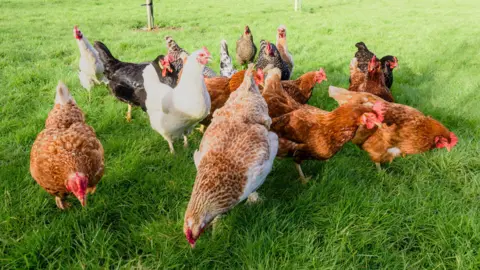Farmers should be 'very concerned' as 12,000 chickens to be culled
 Getty Images
Getty ImagesAbout 12,000 chickens are being culled after a suspected case of bird flu at a commercial poultry premises in County Tyrone, BBC News NI understands.
Disease control measures were initiated by the Department of Agriculture, Environment and Rural Affairs (Daera) at the premises, near Pomeroy, after being reported on 1 November.
A government veterinary officer warned that, in the run up to Christmas, turkey farmers "should be very concerned" as there is currently a higher risk period of avian influenza.
Ignatius McKeown, from Daera said: "Migratory birds, which help to spread avian influenza, are now returning, more or less to winter in Northern Ireland."
'Devastating for that individual farmer'
 Getty Images
Getty Images"At this particular stage they should be reviewing their biosecurity, making sure they are taking every precaution against the entry of avian influenza into their particular flocks," he added.
Agriculture Minister Andrew Muir said on Monday that initial results suggested the presence of highly pathogenic, avian influenza (HPAI), so disease control measures were being introduced at the premises as a "precautionary measure".
Mr McKeown told BBC Radio Ulster's Good Morning Ulster on Tuesday that "it is devastating for that individual farmer, that is his livelihood gone".
He said the chickens would be culled humanely by the department staff.
"Then the premises will be cleansed and disinfected to make sure that the disease has been removed from the premises before the farmer can restock again.
"This is a fairly prolonged process."
He added that bird flu is "stressful for the poultry industry, it is stressful for department staff, it is absolutely devastating for those particular flock owners that get the disease and see their livelihoods wiped out".
"There is help available, there are the various mental health organisations that can provide support to farmers," Mr McKeown said.
"Whenever department staff are carrying out procedures on the farm, we do it in as a sensitive way as possible, because we do realise this is devastating for the farmers involved as well."
Last month, it was reported that about 20,000 chickens were to be culled after a suspected case of bird flu was found at a farm near Omagh in County Tyrone.
Almost 16,000 birds were also culled at a site near Pomeroy earlier this year due to suspected bird flu.
Temporary Control Zones (TCZ) will also be introduced to mitigate for onward disease spread.
The Public Health Agency (PHA) has confirmed Avian Influenza is primarily a disease of birds and the risk to the general public's health is very low.
Analysis: Slaughter of turkey flocks 'ramping up'
Louise Cullen, Agriculture and Environment correspondent
This is the fifth case of bird flu in a commercial premises this year, and a further blow to poultry farmers who have managed to keep the disease out since December 2021.
Poultry is big business in Northern Ireland and Mid Ulster is the heartland of the industry.
Hundreds of thousands of birds are slaughtered every week in Northern Ireland alone - approximately 23 million across the UK - so a single flock is not a threat to supply.
But the disease poses a real risk to the sector, so ultra-tight biosecurity is crucial, with farmers being told to check their premises for any cracks or openings where a wild bird may get in or rainwater may wash disease-carrying faeces in.
You may be thinking about your Christmas turkey, but slaughter of those flocks is already ramping up now.
As one farmer put it to me before, "they don't catch bird flu when they're hanging in the cold store".
What steps can farmers take?
Mr McKeown emphasised the importance of good biosecurity practices "to mitigate and reduce the risks of infection entering your farm".
"This disease is spread from wild birds, is carried into your poultry house, so try to prevent that happening," he said.
"Carry out good biosecurity before entering your poultry house, making sure that you cleanse and disinfect all your equipment again before accessing your poultry house, carrying out good maintenance of your house, because one of the potential methods of spread is by water ingress.
"Make sure that your feed and water is separated from any potential access from wild birds and from vermin as well."
'Crucial to limit any potential spread'
Chief Veterinary Officer Brian Dooher took the decision based on a number of factors including the clinical signs and preliminary results provided by the Agri-Food and Biosciences Institute (AFBI).
He said the disease control measures were "crucial to limit any potential spread of disease" and stressed the "utmost importance of ensuring continuous excellent levels of biosecurity and reporting any suspect cases of avian flu to Daera immediately".
Muir added that all bird owners must adhere to all biosecurity measures to protect their flocks.
Full details of the scope and measures required within the TCZs have been published on the Daera website.
